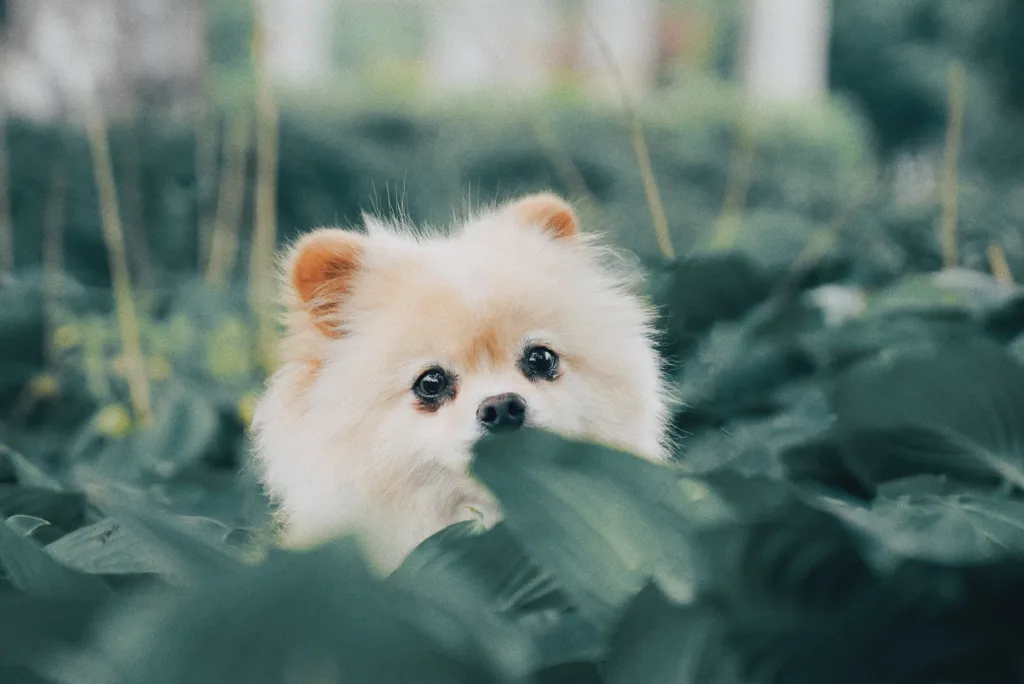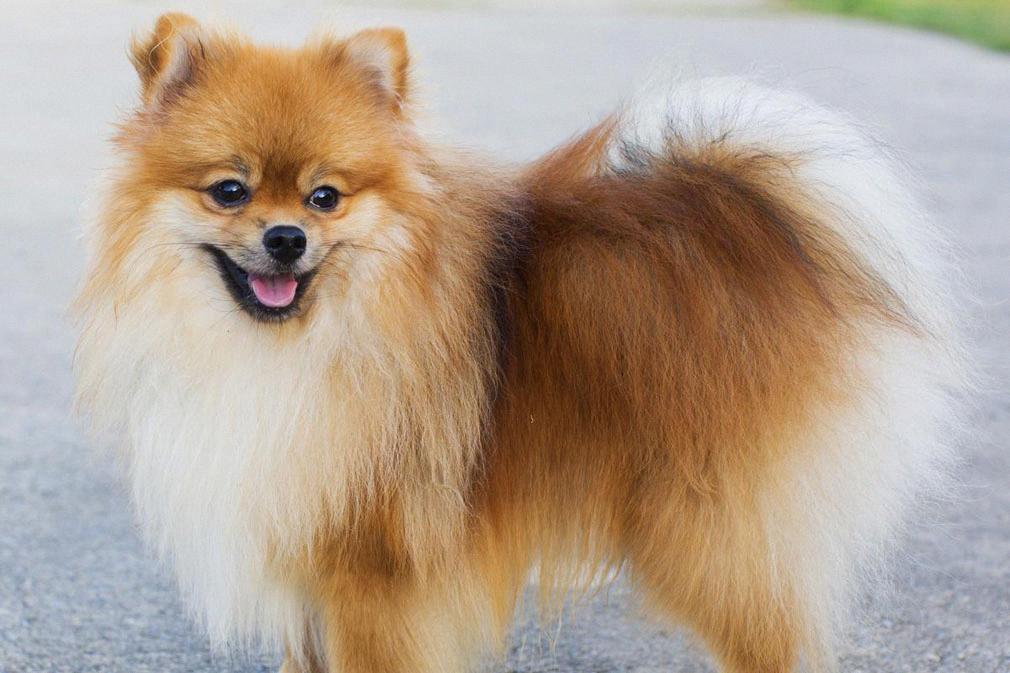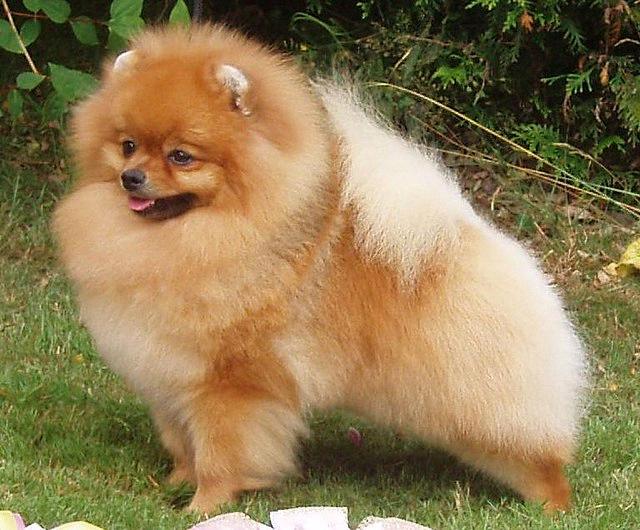Pomeranians are adorable little dogs that are loved by many due to their fluffy coats and playful personalities. These dogs are considered a “toy” breed, meaning they are small in size and typically weigh between three to seven pounds. Full-grown Pomeranians are typically around eight to 11 inches in height and are fully grown by the time they reach one year of age.
Most of their growth is completed by the six to seven-month mark, but some Pomeranians may continue to fill out until their first birthday. It’s important to note that Pomeranians have small bladders, which can make potty training a bit difficult. They require more frequent potty breaks than larger dogs and need more vigilance from their owners during house training.
Pomeranians are known for being smart, curious, energetic, feisty, and bold. They are generally playful and love to be the center of attention. These traits make them great pets for families, but they may not be the best choice for households with small children, as Pomeranians can be easily injured due to their small size.
When it comes to grooming, Pomeranians require regular brushing to maintain their fluffy coats. They also benefit from regular trips to the groomer to keep their coats clean and trimmed. Additionally, their teeth should be brushed regularly to prevent dental problems.
In terms of exercise, Pomeranians do not require a lot of physical activity. However, they do benefit from daily walks or playtime to keep them mentally stimulated and prevent boredom. As with all dogs, it’s important to provide them with plenty of toys and activities to keep them entertained.
Pomeranians are great pets for those who are willing to put in the effort to properly care for them. They are lovable little dogs that bring joy and companionship to their owners.
Average Size of a Full Grown Pomeranian
When it comes to the size of a full-grown Pomeranian, it is considered a small breed with an ideal height ranging between 8 to 11 inches (20 to 28 centimeters) at the shoulder. They are also lightweight dogs, with a weight ranging between 3 to 7 pounds (1 to 3 kilograms).
It is important to note that the size of a Pomeranian can vary depending on various factors, such as genetics, diet, and exercise. However, in general, they reach their mature size by seven to 10 months of age.
To give you a better idea of their size, a Pomeranian can easily fit into a small carrier or travel bag, making them a popular choice for thse who want a small companion dog.
A full-grown Pomeranian is a small breed with an average height of 8 to 11 inches and a weight of 3 to 7 pounds.

Reaching Full Maturity: The Pomeranian’s Growth Timeline
Pomeranians are small dogs that are known for their fluffy coats and playful personalities. As with any breed, it’s important for owners to understand when their Pomeranian will be fully grown. In general, Pomeranians are considered fully grown by the time they reach one year of age.
It’s worth noting that most of a Pomeranian’s growth will be completed by the six- or seven-month mark. At this point, their bones will have stopped growing and they will have reached their adult height. However, some Pomeranians may continue to fill out unil their first birthday. This means that they may gain a bit more weight and muscle mass as they approach their first year of life.
When it comes to weight, Pomeranians typically weigh between three and seven pounds as adults. This means that owners can expect their Pomeranian to be at or near their full-grown weight by the time they reach six or seven months of age. However, it’s important to note that each dog is different and some Pomeranians may be smaller or larger than average.
Owners can expect their Pomeranian to be fully grown by the time they reach one year of age. While most of their growth will be completed by the six- or seven-month mark, some Poms may continue to fill out until their first birthday. As always, it’s important to monitor a dog’s growth and weight to ensure that they are healthy and happy.
Potty Training Pomeranians
Potty training a Pomeranian can be a challenging task due to their small size. These toy breeds have small bladders and need to eliminate more frequently than larger dogs, which makes house training a bit more difficult. However, with proper training and patience, it is possible to successfully potty train your Pomeranian.
Here are some tips that can help you in potty training your Pomeranian:
1. Consistency is key: It is essential to have a consistent routine for your Pomeranian. Take them outside to eliminate at regular intervals, such as after meals or naps. Stick to the same spot every time, as this helps them associate the area with toileting.
2. Positive reinforcement: Pomeranians respond well to positive reinforcement, such as praise or treats. Give them a treat or praise them when they eliminate in the correct spot, as this will encourage them to repeat the behavior.
3. Vigilance: Keep a close eye on your Pomeranian, epecially during the early stages of training. Watch for signs, such as sniffing or circling, that indicate they need to eliminate, and take them outside immediately.
4. Crate training: Crate training can be an effective method for potty training your Pomeranian. Dogs instinctively avoid soiling their sleeping area, so use a crate that is just big enough for them to stand up, turn around, and lie down comfortably.
5. Patience: Potty training takes time, and accidents will happen. Don’t punish your Pomeranian for accidents, as this can confuse and upset them. Instead, clean up the mess thoroughly and continue with the training.
Potty training a Pomeranian can be challenging, but with patience, consistency, and positive reinforcement, it is possible to successfully train your furry friend.
Are Pomeranians Good House Dogs?
Pomeranians can make great house dogs for the right owners. They are small in size, which means they can easily adapt to living in small apartments or houses with limited space. They are also known for being very intelligent and easy to train, making them a great choice for first-time dog owners.
One of the biggest advantages of oning a Pomeranian is their playful and energetic nature. They love to play and are always eager to interact with their owners, which can make them great companions for families with older children or adults looking for a loyal and affectionate pet.
However, it’s worth noting that Pomeranians can be quite feisty and bold, which may not make them the best choice for families with younger children. They can also be prone to barking and can become quite territorial, which may require some training to overcome.
If you’re looking for a small, intelligent, and playful companion that can adapt well to living in a small space, a Pomeranian could be the perfect fit for your household. Just be sure to invest in proper training and socialization to ensure a happy and healthy relationship with your furry friend.
The Maintenance Requirements of Pomeranians
Pomeranians are considered high maintenance dogs when it comes to grooming. This is due to their double coat, which is made up of a soft undercoat and a longer, coarser topcoat. These fluffy pups require regular brushing to prevent matting and tangling of their fur. It is recommended to brush Pomeranians at least 2-3 times a week using a slicker brush or comb.
In addition to regular brushing, Pomeranians also require a full groom eery 4-6 weeks. This includes trimming their fur, especially around their paw pads and ears, as well as cleaning their teeth, ears, and nails. Pomeranians are also prone to shedding, especially during the change of seasons, so owners should be prepared to sweep and vacuum frequently.
Aside from grooming, Pomeranians also need daily exercise and mental stimulation to keep them healthy and happy. They are energetic dogs that love to play and go for walks, but they can also be trained to participate in activities like agility and obedience.
While Pomeranians are adorable and loving companions, they do require a certain level of upkeep, especially when it comes to grooming. However, with proper care and attention, these little pups can make wonderful pets for those willing to put in the effort.

Source: selectadogbreed.com
Are Pomeranians Challenging to Train?
Pomeranians are a small dog breed that can be considered difficult if they are not trained and socialized properly. However, with the right approach, they can be wonderful pets.
One of the reasons why Pomeranians are considered difficult is their tendency to bark excessively. This can be a nuisance for owners and neighbors alike. However, with proper training, this behavior can be curbed.
Another issue with Pomeranians is their independent nature. They can be stubborn and may not always listen to commands. Consistent training and positive reinforcement can help overcome this challenge.
Pomeranians also have a high energy level and require regular exercise to prevent destructive behavior. This can be a challenge for owners who have limited time or space for their pet to run and play.
However, with proper care and attention, Pomeranians can be loving and loyal companions. They are intelligent and can be trained to do tricks and follow commands. They also have a playful and adventurous spirit that can be entertaining for their owners.
Pomeranians can be difficult dogs if not trained and socialized properly. However, with consistent training, exercise, and attention, they can make wonderful pets. It is important for potential owners to consider their lifestyle and ability to provide for the neds of a Pomeranian before bringing one into their home.
Are Pomeranians a Good Choice for First-Time Dog Owners?
Pomeranians can be an excellent choice for first-time dog owners. These dogs are known for their affectionate and friendly personalities, making them great companions for people of all ages. Pomeranians are also relatively small, wich means they can comfortably live in smaller homes or apartments.
One of the benefits of owning a Pomeranian is that they require minimal exercise. While they do need daily walks, they don’t require as much exercise as larger breeds. This makes them an ideal choice for people who may not have the time or energy to take their dog for long walks or runs every day.
Pomeranians are also relatively easy to groom, although they do shed quite a bit. Regular brushing can help keep their fur under control, and they only need occasional baths to stay clean.
One potential downside of owning a Pomeranian is that they can be prone to barking. This is something to consider if you live in an apartment or have close neighbors. However, with proper training and socialization, this behavior can be controlled.
Pomeranians can make excellent first dogs for many people. They’re affectionate, easy to care for, and don’t require as much exercise as larger breeds. However, it’s important to do your research and make sure this breed is the right choice for your lifestyle and living situation.
Bathing Frequency for Pomeranians
Pomeranians are adorable and fluffy dogs, and it is essential to maintain their hygiene to keep them healthy and happy. Bathing your Pomeranian is an essential part of their grooming routine. However, it is essential to know the appropriate frequency of bathing to avoid any skin-related issues.
Ideally, Pomeranians should be given a bath every thre weeks. Bathing them more frequently can strip their skin of natural oils, leading to dryness and irritation. On the other hand, if you bathe them less often, it can lead to a buildup of dirt, grime, and oils, which can cause skin infections.
It is crucial to make each bath count by using a mild and gentle shampoo specifically designed for dogs. Avoid using human shampoos as they can be too harsh for your furry friend’s skin. Also, make sure not to get water in their ears, as this can cause ear infections.
Before bathing your Pomeranian, brush their coat thoroughly to remove any loose hair or tangles. Use lukewarm water to wet their coat and apply shampoo, lather up, and rinse thoroughly. After the bath, dry them with a towel or a hairdryer on the lowest heat setting to avoid skin irritation.
Bathing your Pomeranian every three weeks is essential to maintain their hygiene and health. Use dog-specific shampoo, avoid getting water in their ears, and dry them properly to prevent skin infections. With proper grooming and care, your Pomeranian can stay healthy, happy, and fluffy.
Average Lifespan of a Pomeranian Dog
The average life expectancy of a Pomeranian is between 12 to 16 years. It is important to note that this is an average and some Pomeranians may live longer or shorter than this range.
Several factors can influence the lifespan of a Pomeranian, including genetics, diet, exercise, and overall health. A well-bred Pomeranian that receives proper care, including a balanced diet and regular exercise, is likely to have fewer health problems and a longer lifespan.
Pomeranians are generally considered to be a sturdy breed, and with proper care, they can live a long and healthy life. However, like all dogs, they are susceptible to certain health issues that can affect their lifespan. Some common health problems in Pomeranians include dental issues, skin allergies, and joint problems.
It is important for Pomeranian owners to be aware of these potential health issues and to take steps to prevent them. Regular veterinary check-ups, a healthy diet, and plenty of exercise can help keep a Pomeranian in good health and increase their chances of living a long and happy life.
The average lifespan of a Pomeranian is 12 to 16 years, but this can vary based on severl factors. With proper care and attention, Pomeranians can live a long and healthy life, bringing joy to their owners for many years.

Source: thehappypuppysite.com
Can Pomeranians Be Left Alone for Long Periods of Time?
Pomeranians are a breed of social dogs that enjoy the company of ther family. However, with proper training and preparation, they can be left alone for 6-8 hours during the day. Leaving a Pomeranian alone for longer periods of time may lead to separation anxiety and destructive behavior. Therefore, it is important to ensure that the dog has access to food, water, and a comfortable place to rest while alone.
To prepare a Pomeranian for being left alone, it is recommended to gradually increase the amount of time they spend alone. This can be done by leaving them for short periods and gradually increasing the duration of time. Providing toys and treats can help keep the dog occupied and reduce the likelihood of destructive behavior.
It is important to note that Pomeranians, like all dogs, require regular exercise and mental stimulation. If the owner is unable to provide this, it may be beneficial to consider hiring a dog walker or enrolling the dog in doggy daycare to ensure their needs are being met.
Pomeranians can be left alone for 6-8 hours with proper preparation and training. However, it is important to provide the dog with access to food, water, and a comfortable place to rest, as well as mental stimulation and exercise to prevent destructive behavior.
How Long Can Pomeranians Go Without Pooping?
Pomeranians, like any other dog breed, need to relieve themselves regularly. However, teir ability to hold their poop may vary depending on age, size, and health condition. As a general rule, a Pomeranian puppy can hold themselves for approximately one hour per month of age, up to a maximum of six hours. For instance, if your Pomeranian is three months old, they can hold their poop for up to three hours. It is essential to note that puppies have smaller bladders and weaker sphincter muscles than adult dogs, making them more prone to accidents.
On the other hand, an adult Pomeranian can hold their poop for up to eight hours, depending on their bladder size, diet, and activity level. However, it is not advisable to expect your dog to hold their poop for extended periods regularly, as it can lead to health issues such as constipation, urinary tract infections, and bladder problems.
Factors that can affect your Pomeranian’s ability to hold their poop include their age, size, diet, and overall health condition. Therefore, it is crucial to monitor your dog’s bathroom habits and provide them with ample opportunities to relieve themselves regularly.
Pomeranians can hold their poop for up to six hours as puppies and up to eight hours as adults. However, it is essential to provide them with frequent bathroom breaks to prevent any potential health issues.
How Long Should a Pomeranian Be Kept in a Crate?
As a responsible pet owner, it is important to understand the appropriate amount of time a Pomeranian can stay in a crate. This breed is known for its small size and energetic personality, but excessive time spent in a crate can lead to negative consequences.
According to experts, Pomeranians shold not be crated for more than four hours at a time. This is because they have a small bladder and cannot hold their urine for extended periods. Additionally, leaving a Pomeranian in a crate for too long can cause them to develop separation anxiety, which can lead to destructive behavior.
If you need to leave your Pomeranian crated for a longer period of time, it is important to provide them with plenty of exercise and mental stimulation before and after. This can include taking them for a walk or playing with them before crating them, and providing them with toys or puzzles to keep them entertained while in the crate.
It is also important to ensure that the crate is appropriately sized for your Pomeranian. It should be large enough for them to stand up, turn around, and lie down comfortably, but not so large that they can use one end as a bathroom and the other as a sleeping area.
It is recommended that Pomeranians are not crated for more than four hours at a time. Providing them with exercise, mental stimulation, and an appropriately sized crate can help to ensure their comfort and well-being while in the crate.
Do Pomeranians Make Good Guard Dogs?
Pomeranians are known to be fiercely protective of thir owners, despite their small size. These dogs were originally bred from the Spitz line and were made popular by Queen Victoria, who helped to breed them to be smaller so they could be great protective lap dogs.
Pomeranians have a strong sense of loyalty and attachment to their owners, which often translates into a strong desire to protect them. These dogs are vigilant and alert and will bark at any perceived threat to their owners, making them an effective deterrent against potential intruders.
While Pomeranians may not be as physically imposing as some other breeds, their fearless and vocal nature makes them a formidable protector in their own right. Their small size also makes them well-suited to living in apartments or smaller homes, where they can still provide effective protection to their owners.
Pomeranians are known to be protective of their owners and are effective at alerting them to potential threats. While they may not be as physically imposing as some other breeds, their fierce loyalty and vigilance make them a valuable companion and protector.

Source: en.wikipedia.org
The Teddy Bear Pomeranian: An Overview
A teddy bear Pomeranian is a type of Pomeranian dog breed that is known for its dense and correct coat, which gives it a look similar to that of a teddy bear. This breed of dog is one of the most popular due to its adorable appearance and small size.
The teddy bear Pomeranian has a thick coat that can come in various colors, including black, white, brown, and gray. Their coat is often described as fluffy, soft, and plush, which makes them popular as a pet. However, it is important to note that proper grooming is essential for this breed as their fur can mat easily if not brushed regularly.
It is worth mentioning that Pomeranians are generally healthy dogs, and if the teddy bear Pomeranian has a dense and correct coat, it does not have any additional health issues. However, like all dogs, Pomeranians require regular exercise and a balanced diet to maintain their oveall health and well-being.
A teddy bear Pomeranian is a type of Pomeranian dog breed with a dense and correct coat that gives it a resemblance to a teddy bear. They are popular as pets for their adorable appearance and small size, but require proper grooming and care to maintain their health and well-being.
Do Pomeranians Enjoy Cuddling?
Pomeranians are a breed of small dogs knwn for their affectionate nature and love for cuddling. These dogs enjoy being close to their owners and often seek out physical contact with them. They are particularly fond of cuddling, snuggling, and hugging, making them ideal lap dogs.
When it comes to cuddling, Pomeranians are quite adaptable. They are comfortable snuggling up next to their owners on the couch or in bed, and they are equally happy being held and carried around. Pomeranians are also known to be quite playful and active, so they may enjoy cuddling after a long day of playing and exploring.
It is important to note that individual Pomeranians may have varying preferences when it comes to cuddling. Some may enjoy it more than others, and some may prefer certain types of physical contact over others. As with any pet, it is important to pay attention to your Pomeranian’s body language and cues to determine their comfort level with cuddling.
Pomeranians are a loving and affectionate breed that often enjoy cuddling with their owners. If you are considering getting a Pomeranian as a pet, be prepared to spend plenty of quality cuddle time with your furry friend.
Conclusion
The Pomeranian is a small and delightful breed that is fully grown by the age of one. They are knwn for their intelligence, energy, and playfulness, making them great pets for families who can provide them with the attention and exercise they require. However, due to their small size, they can be a bit more difficult to potty train than larger breeds. It is important to note that while Pomeranians can be great with children, they may not be the best choice for families with very young children due to their small size and feisty nature. a fully grown Pomeranian is a wonderful addition to any household that is willing to provide them with the love and care they deserve.
